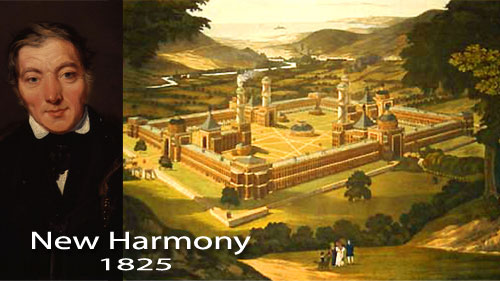|

On
April 27, 1825, British industrialist
Robert Owen, established a utopian community
in the town of New Harmony, Indiana he
had just purchased. This community was
one of the first communes established
to be organized around the principle of
rational ethics instead of religion. Owen
believed that misery and vice in the world
stemmed from a "trinity of evils" : traditional
religion, inequalities in wealth and private
property, and conventional marriage based
on religion and property. He also thought
that through education and nurturing a
person's intellect and spirit, human character
and potential could be developed to its
highest potential and benefit for the
individual and the community. 800 people
were invited to live for free in his utopian
experiment. Although the community proved
to be an economic failure after just two
years, Owen's experiment provided inspiration
for many philosophers and political pragmatists
and in the development of what would eventually
become the principles and practices of
socialism.
Before
coming to America, Robert Owen was a successful
Welsh businessman during the Industrial
Revolution in Britain who had left his
mark on history as one of the leading
social reformers of his time. He is considered
the "father of the cooperative movement."
At the time, most workers lived and worked
in poor conditions for little wages. After
amassing a fortune as an industrialist,
Robert Owen set out to make his new cotton
factory, New Lanark Mills in Scotland,
a cooperative factory community that focused
more on the well-being of the community
than on profits. During the early 1800s
poor children were expected to work in
factories at an early age; For his mill,
Robert Owen set up an infant school, a
day care center for working mothers, providing
education and health care to children
starting when they were three. Children
did not have to work in the mill until
they were 10, which was revolutionary
at the time. He also set up a cooperative
shop that provided high quality goods
at reasonable costs for the mill's workers
and their families. Owen believed that
education and safe cooperative work conditions
would promote a happy, healthy and productive
community of workers. This would not only
be good for the business, but for the
entire society as well. The Mill became
a successful model that prominent social
reformers and industrialists visited.
Owen published many works promoting his
cooperative ideas and attempted to establish
several utopian communities, besides New
Harmony. This visionary philanthropist's
ideals have continued to inspire many
trade and cooperative movements for the
past 150 years.
|